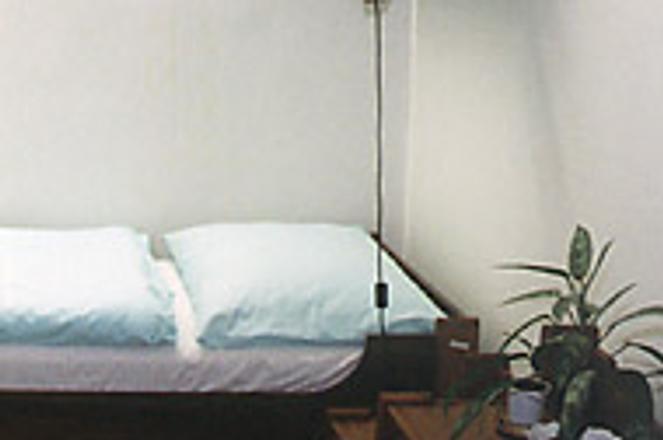A room in the dormitory where members of parliament can stay free. MPs say they need better accomodation.photo: Ján Svrček
With the Slovak unemployment rate hitting an historic high in February (20.7%), recent complaints by several members of parliament over their working conditions have drawn public scorn, causing at least one MP to eat his words.
Marián Mesiarik, an MP for the coalition Party of Civic Understanding (SOP), suggested on March 20 that "a closed-door parliamentary meeting be called to discuss ways to improve the poor conditions under which Slovak lawmakers are forced to work and live".
Mesiarik's disgruntled colleagues say that work conditions in parliament are threatening their physical health. The lighting is too dim, there are "microbes in the air", and the menu at the parliamentary buffet is laden with "fatty and unhealthy" food selections, they say.
"It's impossible to produce quality legislation under the current conditions. From the lights and bad air conditioning, we often get headaches and can't concentrate on doing quality work," said Katarína Tóthová of the opposition Movement for a Democratic Slovakia (HZDS).
Her party colleague Michal Drobný, who is a doctor, said that the poor lighting in parliament left MPs "looking like red-eyed rats". Concerning the air conditioning, he said "it is set too high to work properly".
The comments made front-page news in the Slovak media, and drew a flurry of reader letters, such as one on-line comment for the Sme newspaper on March 21 that "they [MPs] should all spend a spell in Leopoldov [maximum security jail] - that's where most of them belong."
Buttoning their lips
Three days later in parliament, Mesiarik sat shaking his head at the public backlash, asking that the matter be dropped. "I made an idiot out of myself by saying anything," he said. "I made the mistake of verbalising what about 30 of my colleagues have been telling me for ages."
But while the movement to address the issue may have been abandoned, MP Klára Sárkozy from the Hungarian Coalition Party (SMK) remained dissatisfied, saying that because of the substandard conditions, she was a frequent visitor to her doctor - "like many of my colleagues."
The dormitories at parliament are also "unacceptable for lawmakers who are expected to work long hours and then prepare for the next day's session, which requires a lot of reading and studying", she added.
To illustrate her point, Sárkozy took The Slovak Spectator on a tour of the dormitory, where rooms are similar in size to those found in a university dorm but are more luxuriously appointed. MPs get rooms that are approximately 20 square metres in size with one table, two chairs, two beds, a television set and a separate lavatory and toilet.
In the Czech Republic, an MP with the ruling Civic Democratic Party (ODS) said that Czech dormitories were also unsatisfactory, driving most of his colleagues to stay in private flats (subsidized by the state at up to 11,000 Czech crowns).
"We don't have sufficient housing, but we are able to stay in private flats in Prague," said Czech MP Marek Benda. "I don't know what the situation is in Slovakia, but if MPs feel they are coming up short, they have enough power to change things."
Benda said that the Czech parliament building also had several shortcomings. "But over the past 10 years, things have gradually improved. Every working person has a right to complain about working conditions, but for MPs it is easier to actually make changes. Unlike others, we can approve our own budget, have bad lights fixed or bad food selections changed."
Sárkozy said she felt those powers should be put to use. "I understand that there is 21% unemployment in Slovakia, but we should really think about the MPs sometimes. If we are expected to work at a decent level, we should also be given decent living conditions, parking places in front of parliament, and bigger offices to meet important visitors from abroad."
Her call for improved working conditions was hard to swallow for Jozef Konček, a 26 year-old unemployed man from Zvolen "This is disrespectful, and offensive to the reality of the common man in Slovakia," he said. "How dare they complain? Are they living in the same country as I am?"
"If they think they have problems with their eyes, they should go to a hospital," added Konček. "If they're lucky, they'll get treated. But of course, the hospital might be closed, because the whole health system is collapsing."
"I don't know what they were thinking," agreed Darina Malová, a political analyst with Comenius University in Bratislava. "They must have lost touch with the real world that is Slovakia. It's just childish to moan about their aching eyes when the rest of the country would be happy just to have a job."
Sárkozy maintained that citizens who actually saw conditions in parliament understood her point of view. "Every year we have an 'open house' in parliament where citizens can come and see how we work," she said. "Many of the visitors are shocked. They say, 'You really have to work under such conditions?'"
But other MPs noted the sensitivity of the subject and said that conditions in parliament were not a pressing issue in Slovakia. "I think every MP works here voluntarily and therefore shouldn't complain," said Vladimír Palko of the Christian Democratic Party (KDH). "This issue should not be a priority of our country."
Analyst Malová opined that the complainers would do well do bear Palko's advice in mind.
"These complaints are very provocative, and I hope the MPs realise this. If they don't, the abyss between people and their elected representatives in parliament will grow wider."


